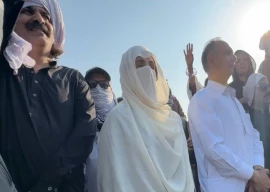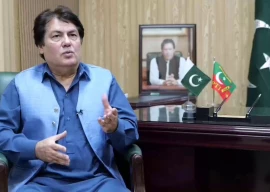
As far back as the early nineties, Pakistan had signed memorandums of understanding to bring gas from Iran via the IPI (Iran-Pakistan-India pipeline), from Turkmenistan via the TAPI (Turkmenistan-Afghanistan-Pakistan-India pipeline) and from Qatar via the Qatar-Pakistan-India project — but sadly, none is anywhere near fruition. Nothing could be a more powerful indictment of Pakistan’s rulers than the fact that notwithstanding the passage of all these years, the idea of a gas pipeline project has remained a dream, primarily because of their lackadaisical approach, preferring short-time expensive options, rather than serious, long-term solutions.
In the meanwhile, Pakistan’s requirements have increased manifold, as is evident from the unprecedented current energy crisis, which has crippled the industry, adversely affected the country’s GDP, thrown hundreds of thousands out of their jobs and left major cities without power for extended periods of time. The current government’s efforts have focused more on rhetorical flourishes rather than on imaginative initiatives, but nothing can compare with the criminal negligence of the Musharraf regime, which showed little interest in this subject, oblivious to the rapidly growing demand for power.
While all three projects have their advocates, most energy experts in Pakistan and those that I have met in Moscow, Beijing and other capitals, are convinced that the Iran-Pakistan project is technically the most feasible and economically viable option, more so if it were to be extended to India. Nevertheless, it has become a hostage to America’s global ‘Iran containment’ policy and our own pusillanimous attitude to it. Admittedly, the US has a domestic law that prohibits foreign investment of more than 20 million dollars into Iran, on the rather spurious reasoning that it would promote its alleged terrorist and/or nuclear weapons programmes. Though this law has no international sanction, various US administrations have continued to use diplomatic leverage to deter Pakistan from pursuing the project, while warning potential energy companies and investment houses to stay away from it.
But what is particularly galling is that while the US regularly reiterates its opposition to the project, it has done little to offer serious alternatives. It would be relevant to recall that when the US-India civilian nuclear deal was first disclosed in June 2005, analysts and experts here had urged the government to convey Pakistan’s concerns at this arrangement, while also using it to extract American assurance of tacit approval for the IPI project. Sadly, the government dismissed these suggestions on the plea that what happened between America and India was of a little concern to Pakistan! The Bush administration also persuaded India to opt out of the project, while seeking to assuage our concern by hyping the TAPI project and getting the Asian Development Bank to host seminars and conferences on it. While there is no doubt that Turkmenistan’s offer has its merits, its immediate execution remains dependent on the security situation in Afghanistan.
With the energy situation in Pakistan deteriorating alarmingly, the Obama administration made it a major area of interest and the late US ambassador Richard Holbrooke (as well as Secretary of State Hillary Clinton) repeatedly assured us that US assistance in this sector would be both immediate and effective. But so far not much has emerged, other than money for upgrading and repairs of existing dams and thermal projects. Instead, it now appears that the current government’s favourable response to Iran’s urgings to clear the underbrush of issues relating to the IPI, has unnerved the Obama administration enough to make it caution Pakistan again of the pitfalls of going with it. This is deeply regrettable. Instead, the US would do well to seize a great opportunity of demonstrating its commitment to Pakistan’s economic well-being, while also encouraging India to join in as well, as the pipeline could help strengthen meaningful economic cooperation in the region. In any case, we have no alternative but to remain committed to the project.
Published in The Express Tribune, September 21st, 2011.
COMMENTS (12)
Comments are moderated and generally will be posted if they are on-topic and not abusive.
For more information, please see our Comments FAQ








1732643921-0/4548774-1403918848-(1)1732643921-0-270x192.webp)








@Meekal Ahmed: I have not named or blamed these instruments or their mentors, which have mainly cobbled the contemporary world as a "safe, developed, harmonious, hunger and disease free and happiest ever place since the birth of mother earth." We have our shortcomings, which are countless and fatal, but the role played by them has mainly made today's world unlivable for billions of human beings in various conflict zones. We may keep on arguing about these organizations but the fact remains the my country needs various and multiple sources of energy supply and that too at a lightening speed. The agenda of super power, regional players or other actors may be good or bad for them but the fact remains that our survival is linked to energy security. Therefore, for us this is time to act or perish.
@arif mahmood: Why is it always CIA-RAW-MOSAD-IMF-WB-MI6 that is supposed to explain everything?
The game of musical chairs of IPI, TAPI and Qatar pipelines and now Thar coal project is nothing but a ploy of enemies of Pakistan to destroy the economy of the country through starvation of energy, which is the most important input for survival as well sustaining the nation. During the last decade or so dozens of oil and gas pipelines, energy corridors and other mega projects has been built in various regions, but unfortunately our country remains victim of international conspiracy and local vested interests in this life or death matter. The vicious game is to cleverly deprive pakistan of all three pipelines and other options by telling the minuses and pluses of various alternatives. We have always befooled by them in a very simple manner. If we take a little step forward towards IPI, then suddenly TAPI gets place in news stories. If we look towards considering TAPI, then Qatar is presented as a better alternative. When we give a serious thought to Qatar then IPI becomes relevant in the headlines. What we need to think is that our energy deficiency is so acute and alarming that this nation of 200 millions can not survive and sustain unless not only atleast one pipeline is completed immediately, but eventually all three pipelines alongside Thar coal, hydro, wind, solar and all other natural resources have to be made available. Shamelessly, during last two decades or so our leaders have again and again signed many MOUs and issued hundreds statements on each pipleline, but without taking any concrete step, whereas others nations have accomplished manifold without such ceremonies and limelight. We must wake up or we are doomed for ever. Unless we act, we will be burried deep in the dustbin under the tons of papers and files tagged MOUs.
This is a good Article which explains everything in one go. I will be one of the happiest Pakistanis to see this IP Gas pipeline project on the ground, Pakistan has clearly told US to keep its nose out of this affair.
@ John B, I was reading just now fedral govt decided to go ahead with the project and i think IP will get done at any cost now the time has come pakistan has to decide whether do or die.
The US is well within its rights to sanction Iran, as well as any entity that deals with Iran. If Pak believes that the IP pipeline is in its best interest, it should by all means go ahead with the IP pipeline. But then you shouldn't cry foul when US sanctions prevent Paki banks and other institutions involved in dealing with Iran from doing business with the US. US policy is fairly clear - you can do business with Iran or do business with the US. For once, Pak should demonstrate the courage to take a decision and be willing to accept its consequences.
As you rightly pointed out that the TAPI pipeline is not feasible because of the security situation in Afghanistan, so is the IPI because of the situation in Pakistan. But what about the IP pipeline. You say that the US is "unfairly" denying it to Pakistan. Well, ever since OBL was discovered living comfortably right next to a prestigious military academy in Pakistan for more than 6 years, the Americans consider Pakistan to have let them down. So they will try everything possible to bring down Pakistan. As their leaders have said, they will hunt down and eliminate ANYONE who harms US interests.
By 2015, Pakistan's population will be over 200 million people and the energy requirements are estimated to have increased by more than 40% as compared to 2011. Already Pakistan is experiencing its worst energy crisis in the history of the nation. Unfortunately the national reserves except for hydro-electricity are not enough for such a large population. The gas fields are fast depleting so are oil fields. Other sources within the borders namely solar and coal are much hyped and unproven. No industrial nation has yet been able to sustain itself on solar/wind power generation and at any rate, the electricity produced by these methods are still technologically expensive. Wind power is at the moment 5 times more expensive than nuclear power per unit cost and solar even more so. Coal reserves of Pakistan are of a poor quality called Lignite and it can not meet more than a fraction of Pakistan's requirements. Pakistan though has the potential to generate some 60,000 MW of hydro electricity if environmental and political considerations can be dispelled. But even this amount can not cover for more than a part of Pakistan's energy requirements. For example as per UN, Pakistan is estimated to have a population of 360 million by 2050 when the population is finally stabilized. Also as per UN recommendation a developed nation has to have atleast 1 KW of electric generation capacity installed for each person at minimum. This means Pakistan has to have atleast 360,000 MW of installed capacity. Right now we have only 21,000 installed. Even if we build all dams possible it would go up to just 81,000 MW. Bring in the additional potential solar, wind, coal and nuclear projects in the next four decades and these would just be enough for just a third of Pakistan's requirement. Also consider the fact that electricity is not the only form of energy required. Transportation depends on oil and gas as also industry and home cooking and heating depends on gas. Oil is expensive and will become even more expensive in future. So this leaves Pakistan with gas as the most rational option. Combined gas power plants and trigeneration units running on natural gas produce electricity at less than fifth of an oil fired power plant and at costs cheaper than nuclear plants and almost at the same level as of hydroelectric dams. Basha dam having an installed capacity of 4000 MW will cost 15 billion dollars to get operational. A same 4000 MW combined cycle natural gas power plant costs just 1.5 billion dollar, almost ten times cheaper. The only problem Pakistan has is to source the gas required to power Pakistan, since Pakistan already has a fairly modern gas infrastructure since it has been using it for more than half a century and depends on it for more than 50% of its total energy requirements be it transportation, industry or domestic. The best way to source gas is from a country that has a large reserves so that it can supply Pakistan for foreseeable future and is near enough to lay a pipe line. The only country meeting both these technical and geographic requirement is Iran. LNG is much more expensive than pipe line since liquefying natural gas to -170 degrees centigrade and heating it up again to gassify it needs expensive installations and high energy costs of conversions and transportation of this cryogenic fluid. TAPI passes through Afghanistan a country whose security situation has been dire since history can remember. IPI is the only option. Any more delay in this vital strategic project will cause Pakistan to pay back in terms of devastating economic situation and the following security unrest coming out of economic desperation.
Is IPI pipeline a bargaining chip or a statement against US at this time in history?
PAK has to wait for a long time for her gas via IP(I) if this approach continues.
IPI benefits only Iran as producers. TAPI has the potential to be linked with Russia and other central Asian gas reservoirs. Throw in the world politics of the last 30 years and one will get the feeling where IPI is heading. PAK should have sensed it when India pulled out of the deal.
Until a US president lands in Tehran to open the diplomatic mission, IP(I) gas line will be accumulating rust. I do not see this happening for the next 10 years especially with the Palestinian-Israel are in stand off mode now.
So gas from IP(I) pipe line to solve PAK immediate energy need is a wishful thinking.
What is important for Pakistan? Operation of IPI gas line or getting gas from whatever sources available as cheaply as possible?
PAK does not have the bargaining strength or clout. If she did, the flood in Sindh would have seen overwhelming response from international community.
Trade and foreign policy are interconnected and PAK and US are not on the same page with Iran for various reasons.
So gas from IP(I) gas line for PAK ?
Thank you for your frank discussion of the pipeline issue. What is often forgotten in politics around the world is what always matters the most, how policies impact the people it is meant to affect. For example, the sanctions regime that the US has placed against Iran to "defend its interest," really has its most effect on the daily lives of the Iranian people and the same is true with this pipeline project, the Pakistanis are made victims. Unfortunately, the world still operates on the cold war mentality of last century, and third world countries with decreased levels of education among the populace, rampant poverty, corruption and unsecure, unstable governments (yes you Pakistan!) are most likely to fall prey to this mentality.
Remember folks, money doesn't rule the world, God does.
Pakistan must realise that it cannot run with the hare and hunt with the hound. If the writer, presumably a seasoned veteran of Pakistan's foreign policy establishment, does not understand the undercurrents of the Saudi animosity with Iran and Pakistan's efforts to flirt with both regimes then that is most unfortunate. Pakistan's "all-weather" friend, Saudi Arabia, is in bed with the US to contain Iran. A weak and bankrupt state like Pakistan has little, if any, leverage to make foxy moves. It's bread is buttered by the Saudis and the Americans. These two countries are responsible for getting Pakistan involved in the Afghanistan mess under the stewardship of Zia-ul-Haq and Sahibzada Yaqub; twenty-two years later the mess has metastasized enormously and the 180 million people of Pakistan are paying a huge price with the imminent collapse of the unwise strategy.
The Onus is on the pakistani establishment to resist US pressure, specially the khakis(who are the de-facto decision maker of our foreign and strategic policy) to be defiant and for once in their life, do what is good for common pakistanis. But will they forego their own financial interests for the benefit of pakistani? If the past is any guide i doubt it. What good is nuclear bum and over sized and over paid army if they bow down to a single phone call or pressure from US?